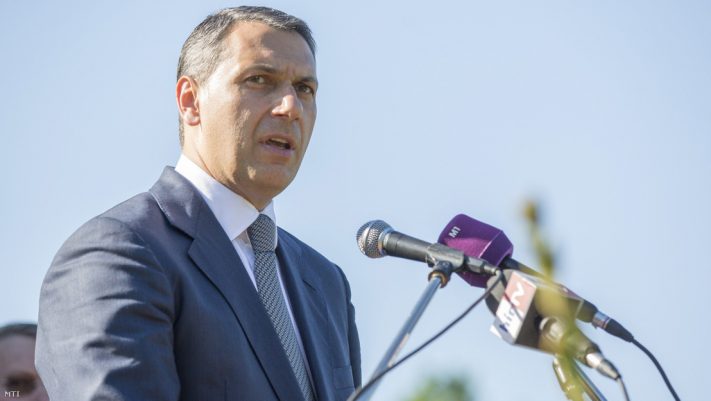A spokesperson for Romania’s Ministry of Foreign Affairs has expressed “disappointment” over remarks that a high ranking Hungarian government minister made about the 1920 Treaty of Trianon and demands for an apology to Hungary. János Lázár, in a speech on the anniversary of a treaty which saw historic Hungary lose three fourths of its territory and two thirds of its population, made several demands, most of which implicated neighbouring Romania, a beneficiary of Trianon.
Mr. Lázár, Minister of the Prime Minister’s Office, remarked:
“A trauma never only has victims, but also perpetrators, collaborators and beneficiaries. It is their responsibility, yet we do not find the monuments of atonement and apology in Paris, in the castles of Versailles, in southern Slovakia, Transylvania, Partium, northern Serbia, nor in Subcarpathia. Nowhere do we find even a symbolic gesture of apology or an attempt to face the past on the part of the successor countries of the Entente.”
The minister then added emphasis: “Trianon was a diktat, a historic injustice against a nation. The entire western world is indebted to Hungary.”
To be clear, Mr. Lázár pointed out that the government of Hungary did not seek a redrawing of national borders, but it does demand rights for Hungarian minorities living in neighbouring countries, including the preservation of bilingual street and road signs, guarantees for Hungarian minority institutions, as well as local autonomy for Hungarian communities and regions. What type of regional autonomy does Mr. Lázár have in mind? He brought up the autonomous community of Catalonia and also South Tyrol as two examples. He was most likely thinking first and foremost of the Hungarian majority counties of Hargita and Kovászna, in Romania, as well as parts of Maros county, which also has a dominant Hungarian presence. The question of autonomy for this region, called Székelyföld, has broad support among ethnic Hungarian politicians in Transylvania, although it is not widely seen as a priority, nor actionable in the near future. Romania is a unitary state and no mainstream Romanian political party supports autonomy for Székelyföld.
Spokesman for the Romanian Ministry of Foreign Affairs Paul Ciocoiu responded to the address, as well as to other comments by Hungarian leaders on Trianon. “We express our disappointment to Hungarian leaders for their consistently provocative stance vis-à-vis Romanian authorities, the Romanian people and its history,” said Mr. Ciocoiu. He added that such provocations are “dangerous.”
There is no question that the Treaty of Trianon remains a very sensitive point for many Hungarians, nor is it deniable that around 3.3 million Hungarians suddenly found themselves without guaranteed rights in successor states that were often hostile to their presence. Romania has made progress in terms of guaranteeing some of the cultural and language rights of Hungarians in Transylvania and we are now thankfully well beyond the days of Kolozsvár (Cluj Napoca) Mayor Gheorghe Funar, who built his political agenda on mawkish displays of Romanian ultra-nationalism and the demonization of around one fifth of the city’s population who spoke Hungarian. One of the positive outcomes is the growing number of bilingual signs in those towns where the Hungarian population exceeds 20%.
Yet at the same time, significant problems remain. I recall visiting Marosvásárhely (Târgu Mureș) two years ago, where ethnic Hungarians form 43% of the local population and where the mayor has had a very checkered past, in terms of inter-ethnic relations. While the ethnic Romanian taxi driver who drove me from the train station immediately made a good effort to speak Hungarian when he realized that I did not speak Romanian, getting Hungarian language services from national institutions (such as the post office) is difficult. A local friend of mine who had worked at the post office for well over a decade remarked that Hungarian employees are discouraged from speaking in Hungarian with each other–and sometimes it is none other than their ethnic Hungarian supervisor who instructs them to switch to Romanian.
Surely there is work to do in terms of expanding the rights of ethnic Hungarian minorities and communities in neighbouring countries. And surely one way to do this is to maintain strong, close working relationships with the governments of those countries that show an openness to the needs of their Hungarian populations.
